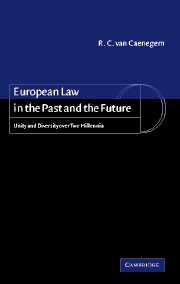Book contents
- Frontmatter
- Contents
- Preface
- 1 The national codes: A transient phase
- 2 Ius commune: The first unification of European law
- 3 Common law and civil law: Neighbours yet strangers
- 4 The holy books of the law
- 5 Why did the ius commune conquer Europe?
- 6 Law is politics
- Epilogue: A look into the twenty-first century
- Bibliography
- Index
5 - Why did the ius commune conquer Europe?
Published online by Cambridge University Press: 06 August 2009
- Frontmatter
- Contents
- Preface
- 1 The national codes: A transient phase
- 2 Ius commune: The first unification of European law
- 3 Common law and civil law: Neighbours yet strangers
- 4 The holy books of the law
- 5 Why did the ius commune conquer Europe?
- 6 Law is politics
- Epilogue: A look into the twenty-first century
- Bibliography
- Index
Summary
THE RE-ROMANIZATION OF THE WEST
That western Europe would one day discover Justinian's lawbook was to be expected: renewed contact with the Greek world and the Crusades – inter alia to Constantinople – would have seen to that. And one can suppose that the discovery would have stirred interest and caused academic discussion, comparable to present-day studies of the law of the Egyptian papyri or the Assyrian clay tablets. It was, however, far from self-evident that the ‘rebirth’ of the Corpus iuris in the twelfth-century School of Bologna would be the start of a triumphal march that would change the legal face of Europe. Why should the discovery of the laws of a bygone civilization affect the West so deeply? And why should the previously unknown lawbook of a Byzantine emperor, who had ruled over a tiny part of the Latin world, change the character of Western law? This hi-jack of medieval European law by Justinian's Corpus iuris is both so amazing and so important that its causes deserve to be analysed in some depth. It is obvious that this romanization – or re-romanization – of western law, which covered eight centuries and numerous countries, was not caused by one single factor: complex influences were at work, which we shall now proceed to analyse.
LEGAL CAUSES
There was, to begin with, a purely legal cause, i.e. the intrinsic quality of the Corpus iuris and the medieval teaching it produced.
- Type
- Chapter
- Information
- European Law in the Past and the FutureUnity and Diversity over Two Millennia, pp. 73 - 88Publisher: Cambridge University PressPrint publication year: 2001



